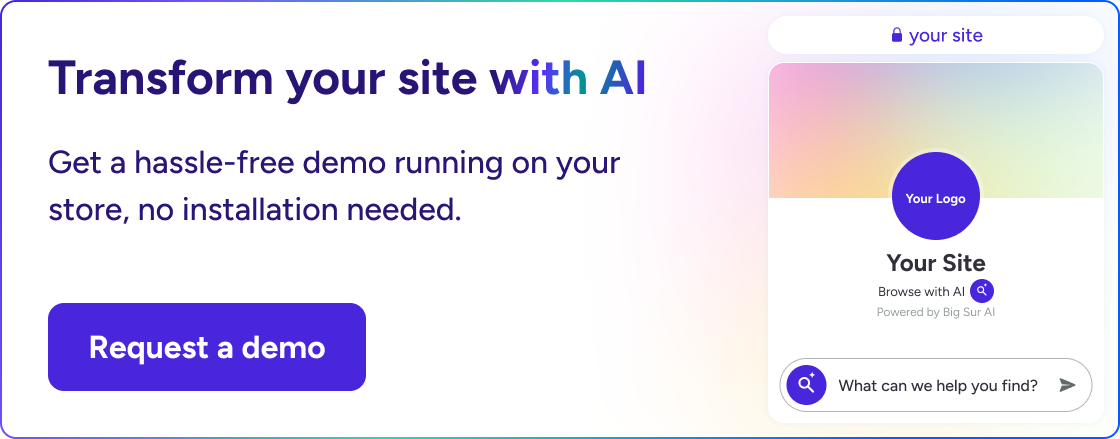Gorgias Pricing: Is it Worth it & What to Expect? [2025]
What’s Gorgias’s real pricing model?
Is it worth the money in 2025?
This guide reviews Gorgias’s pricing model, plan tiers, add-ons, and usage-based fees.
TL;DR
- Gorgias has public, ticket-based plans with unlimited users on paid tiers, and costs scale with monthly billable ticket volume.
- Starter is $10 per month with 50 billable tickets and core channels, with overages available in 100-ticket blocks.
- Basic is $60 per month with 300 billable tickets, an omnichannel inbox, rules and macros, and basic reporting.
- Pro is $360 per month with 2,000 billable tickets, priority onboarding, revenue attribution, and deeper ecommerce reporting.
- Advanced is $900 per month with 5,000 billable tickets, dedicated success resources, and granular permissions.
- If you exceed your allowance, you pay overages or upgrade, and seasonal spikes can drive surprise costs without planning.
- Automate and AI Agent are add-ons billed by successful automated resolutions and AI-resolved conversations, which typically do not consume ticket quota.
- Voice is usage-based with per-minute and per-number fees, and SMS and WhatsApp incur third-party pass-through charges.
- There is no permanent free plan, but you can start with a free trial to connect channels and test workflows.
- Effective self-service and deflection can materially reduce billable tickets and total cost.
- Reviews cite strong value for Shopify-centric brands, with the most common complaint being peak-season overages.
- Annual commitments often come with discounts compared to month-to-month billing.
At the end of this guide, we’ll introduce a new AI-powered solution that can be an alternative to Gorgias or a complementary solution.
Complete summary of Gorgias’s pricing in 2025
| Plan | Best For | Key Strength | Drawbacks | Pricing |
|---|---|---|---|---|
| Gorgias Starter | Very small stores testing a helpdesk with low monthly volume | Low entry price, core channels (email, chat, FB/IG), unlimited users | 50 tickets get consumed quickly with chat/social; overages likely | $10/month, includes 50 billable tickets; 100‑ticket overage blocks |
| Gorgias Basic | Small teams handling email/chat/social with ~300 agent‑replied tickets | Omnichannel inbox, rules/macros, basic reporting, unlimited seats | Social engagement can turn into billable tickets; costs spike during promos | $60/month, includes 300 billable tickets; add 100‑ticket increments as needed |
| Gorgias Pro | Growing brands needing 2k ticket cap and deeper ecommerce reporting | Priority onboarding, revenue attribution, broader integrations | Per‑ticket model can penalize long threads/escalations | $360/month, includes 2,000 billable tickets; 100‑ticket overage blocks |
| Gorgias Advanced | Larger teams with complex setups and granular permissions | Dedicated success resources, advanced controls, enterprise integrations | Analytics depth/data portability may limit enterprise BI workflows | $900/month, includes 5,000 billable tickets; optional overage blocks |
| Gorgias Enterprise | High‑volume, multi‑brand orgs needing SLAs, SSO/SCIM, security reviews | Custom limits, dedicated technical support, sandbox environments | Ticket‑commit contracts shift seasonal risk; over‑buying or punitive overages | Custom pricing; typically 10,000+ billable tickets with negotiated tiers/terms |
| Gorgias Automate (add‑on) | Teams prioritizing self‑service/deflection for FAQs (order status, returns) | Billed by successful automated resolutions; lowers billable ticket counts | Requires intent setup/training; short trials may not show full impact | Usage‑based per automated resolution; separate from seats |
| Gorgias AI Agent (add‑on) | Brands targeting autonomous resolutions without human intervention | Charged per AI‑resolved conversation; typically doesn’t consume ticket quota | Needs guardrails/handoffs; ROI depends on resolution rates | Per successfully resolved conversation |
| Gorgias Voice (add‑on) | Phone‑heavy programs needing native voice within the helpdesk | Omnichannel context with native calling | Minutes/numbers can outgrow base subscription in voice‑heavy workflows | Pay‑per‑minute usage + per‑number fees; storage may add costs |
| SMS/WhatsApp (pass‑through) | Order updates, campaigns, and two‑way messaging | Channel reach integrated with support workflows | Third‑party per‑message/per‑conversation + compliance fees; variable with promos | Pass‑through fees by destination/message type; billed on top of base/overages |
| Overages & seasonality | Brands with peaks (promos, holidays) exceeding monthly bundles | Overage blocks or temporary upgrades to cover spikes | Surprise invoices if not modeled; campaigns can rapidly inflate billable tickets | Base plan + overage for tickets beyond allowance; consider temporary blocks |
| Gorgias Free Trial | Hands‑on evaluation before purchase | Connect store, unify channels, launch basic self‑service, access reports | Short window makes it hard to assess deflection/revenue impact | Free trial, then paid plan billed by billable tickets |
| Big Sur AI (top alternative) | Ecommerce teams prioritizing conversion lift with predictable, no‑surprise costs | Proactive conversion‑optimized prompts, 24/7 AI sales agent, behavioral analytics, A/B testing, guided flows, human handoff | Not a full helpdesk/ticketing system; pair with a helpdesk for complex support | Transparent plans with unlimited seats; usage tied to AI conversations/site traffic; hard caps/pacing; optional performance model aligned to incremental revenue (see https://bigsur.ai/pricing) |
Gorgias's plans
Gorgias is an ecommerce customer service platform that centralizes support across email, live chat, social media, SMS, and voice, with deep integrations to Shopify, BigCommerce, and Magento.
There are multiple Gorgias products:
- Gorgias Helpdesk.
- Gorgias Automate.
- Gorgias Voice.
- Gorgias AI Agent.
Gorgias’s pricing works with plan tiers and add-ons structured roughly as follows:
- Plan tier by billable tickets: Core subscriptions are tied to the number of billable tickets your team handles in a period. Higher tiers include larger ticket allowances and more features.
- Overage blocks or upgrades: If you exceed your ticket allowance, extra ticket packs or a plan upgrade may apply to cover the additional volume.
- Seats: Most tiers include unlimited users, so headcount growth typically doesn’t increase your base subscription.
- Automate add-on pricing: Self-service and automation features are usually priced by successful automated resolutions rather than by seats.
- AI Agent pricing: Autonomous AI resolutions are commonly billed per successfully resolved conversation without human intervention.
- Voice usage-based costs: Phone support generally includes pay-per-minute usage and per-number fees.
- Messaging/channel pass-through fees: Certain channels like WhatsApp or SMS can carry third-party per-conversation or per-message and compliance fees that pass through to you.
- Billing term: Discounts are often available for annual commitments compared to month-to-month billing.
Here’s a little sneak-a-peek into Gorgias's products:
Does Gorgias have a free version?
Gorgias does not offer a permanent free plan.
You can, however, try Gorgias on a free trial.
During the trial, you can:
- Connect your e-commerce store (e.g., Shopify, BigCommerce, Magento) and import customer/order data
- Manage email, live chat, social DMs and comments from a unified inbox
- Use macros, rules, tags, and views to automate workflows
- Launch basic self-service/automation (e.g., order status, returns) to deflect tickets
- Access reporting to monitor volume, response times, and agent performance
- Install integrations from their app ecosystem to round out your stack
- After the trial, you’ll need to move to a paid plan that prices by billable tickets.
Gorgias's Starter
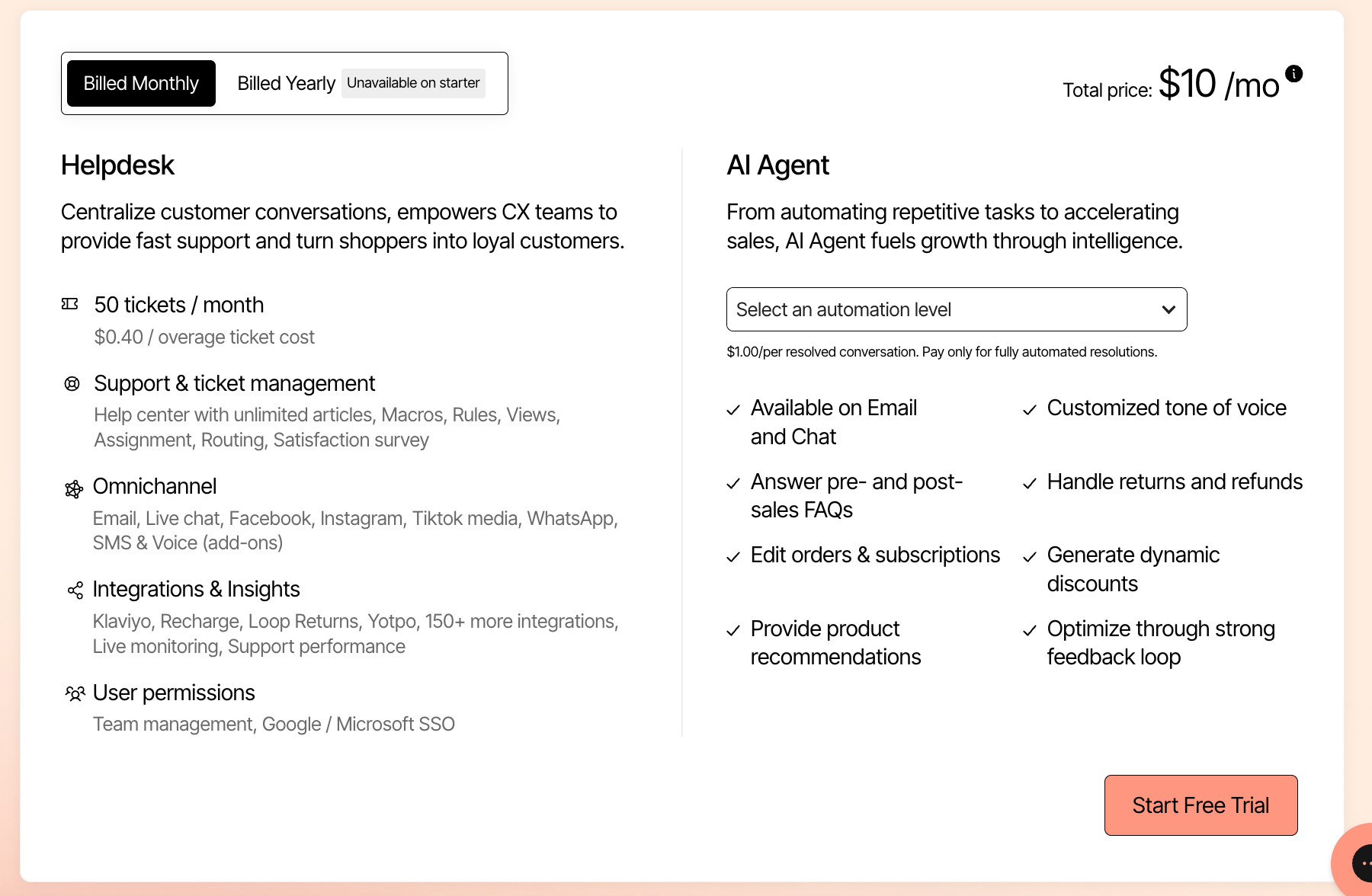
Gorgias’s Starter plan is $10 per month and includes 50 billable tickets per month.
Pricing is structured by included monthly billable tickets, with overage available in additional 100‑ticket blocks.
- 50 billable tickets per month included.
- Unlimited users.
- Core channels: email, live chat, and native social integrations for Facebook and Instagram, plus Shopify-centric tooling.
- Native integrations with Shopify and Shopify Plus, BigCommerce, and Magento.
- Core macros, rules, tags, views, and basic analytics.
Drawback - 50 tickets gets consumed quickly if you run live chat or engage on social
For any store that uses chat for pre‑sales or replies to social comments and DMs, 50 billable tickets is often exhausted early in the month, making overages likely and total cost hard to predict unless you aggressively deflect with self‑service.
Gorgias's Basic
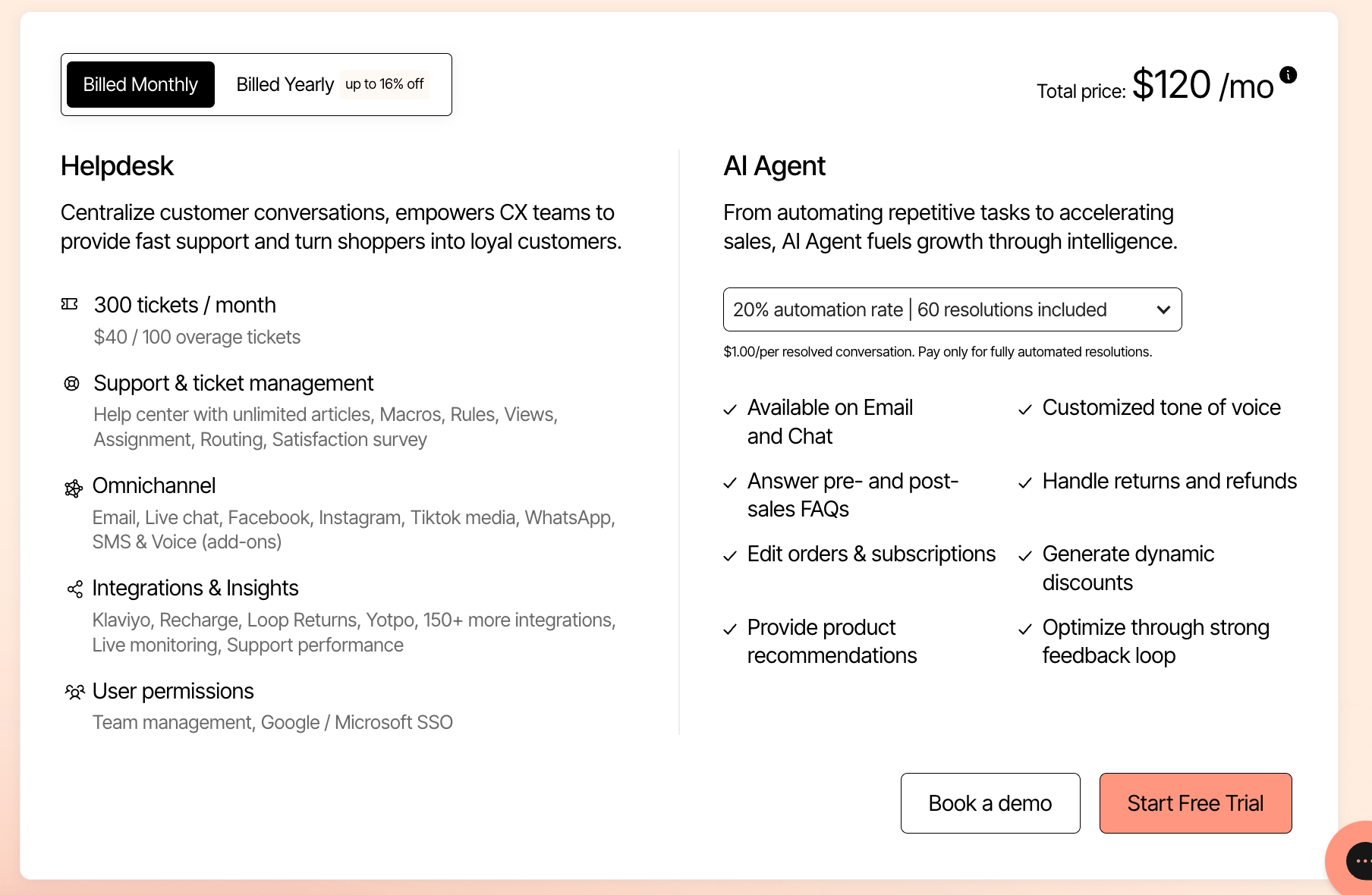
Gorgias’s Basic plan is $60 per month and includes 300 billable tickets per month.
Pricing is structured around included monthly billable tickets, with additional usage purchasable in 100‑ticket increments.
- 300 billable tickets per month included.
- Everything in Starter.
- Unlimited users.
- Omnichannel inbox across email, chat, and social, with ecommerce integrations prebuilt.
- Automation with rules and macros, views, and basic reporting.
Drawback - Billable ticket counting can turn routine social engagement into paid volume
If your team replies to public comments or DMs to drive conversion, each agent reply can convert activity into a billable ticket, so campaigns and promos can spike costs unpredictably even though your agent headcount stays flat.
Gorgias's Pro
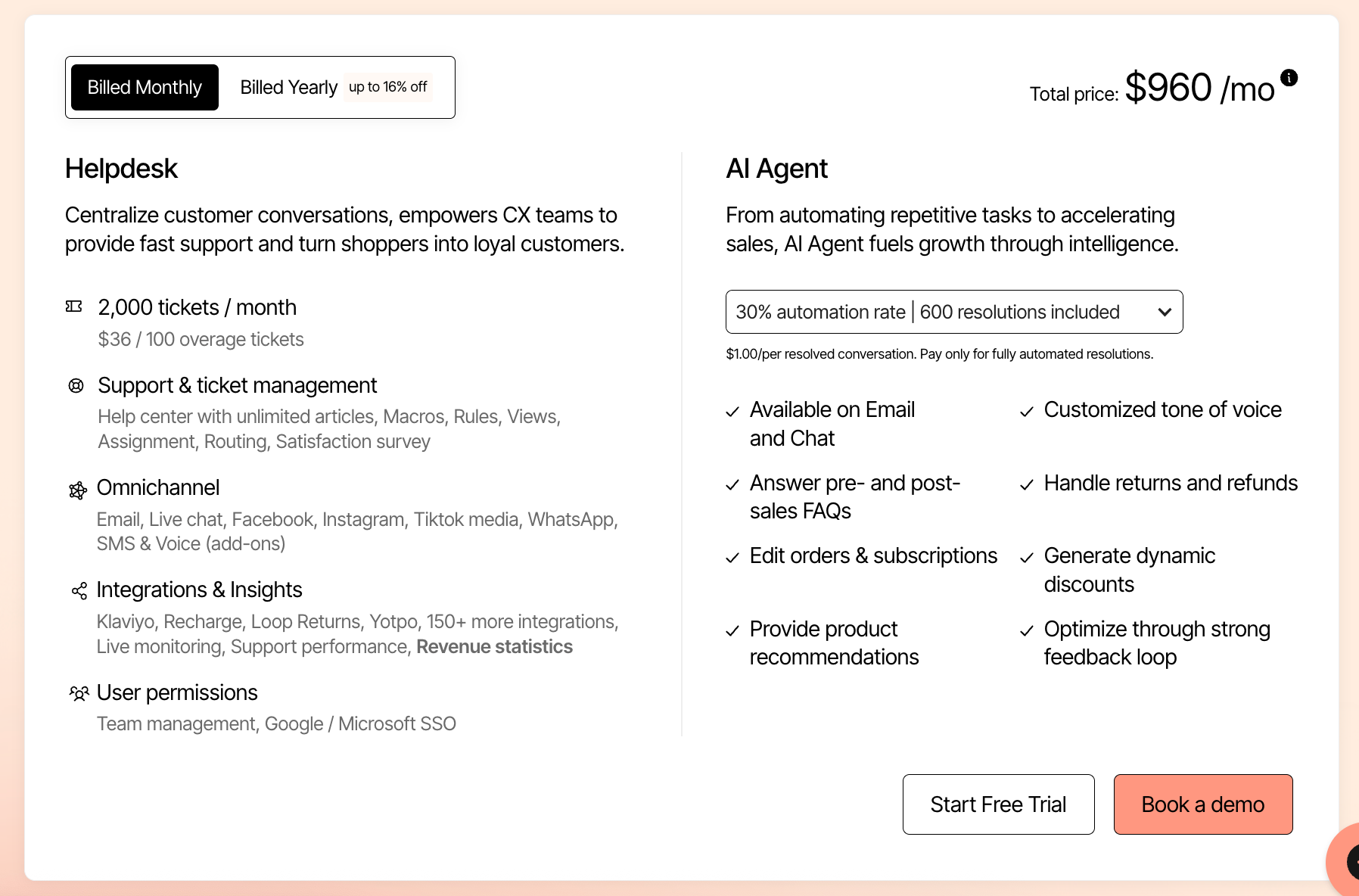
Gorgias’s Pro plan is $360 per month and includes 2,000 billable tickets per month.
Pricing remains volume-based, and you can buy overage in additional 100‑ticket blocks as needs fluctuate.
- 2,000 billable tickets per month included.
- Everything in Basic.
- Priority onboarding assistance and faster support response targets.
- Deeper ecommerce features like revenue attribution to support interactions and more detailed reporting.
- Unlimited users and broad app marketplace integrations.
Drawback - Per‑ticket economics can penalize longer threads and escalations
If your motion skews high-touch with multi-message resolutions, internal escalations, or specialist queues, the same order can consume more billable tickets than an agent-based model would cost, eroding the value of the higher cap.
Gorgias's Advanced
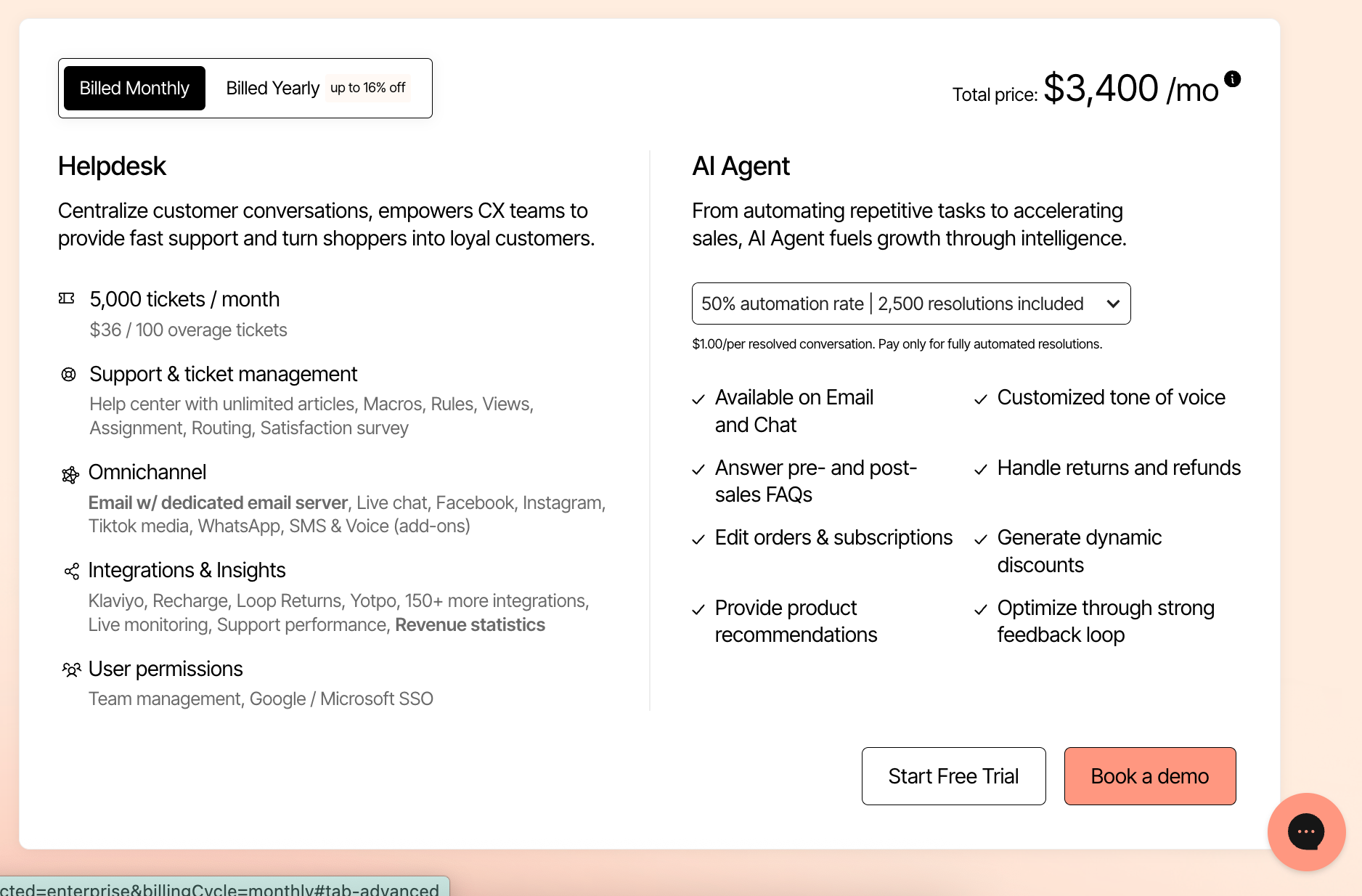
Gorgias’s Advanced plan is $900 per month and includes 5,000 billable tickets per month.
Pricing continues to be tied to included ticket volume with optional overage blocks for peak periods.
- 5,000 billable tickets per month included.
- Everything in Pro.
- Dedicated success resources and onboarding for complex setups.
- Advanced controls suited for larger teams, including more granular permissions and policy tooling.
- Unlimited users, full channel coverage, and enterprise‑grade integrations.
Drawback - Analytics depth and data portability can limit enterprise BI workflows
Larger brands often want cross‑store, cohort, and custom metric modeling in their own warehouse; Gorgias’s out‑of‑the‑box reports are solid but not a full BI layer, so teams may lean on exports and APIs that require extra modeling work and can add latency to decision making.
Gorgias's Enterprise
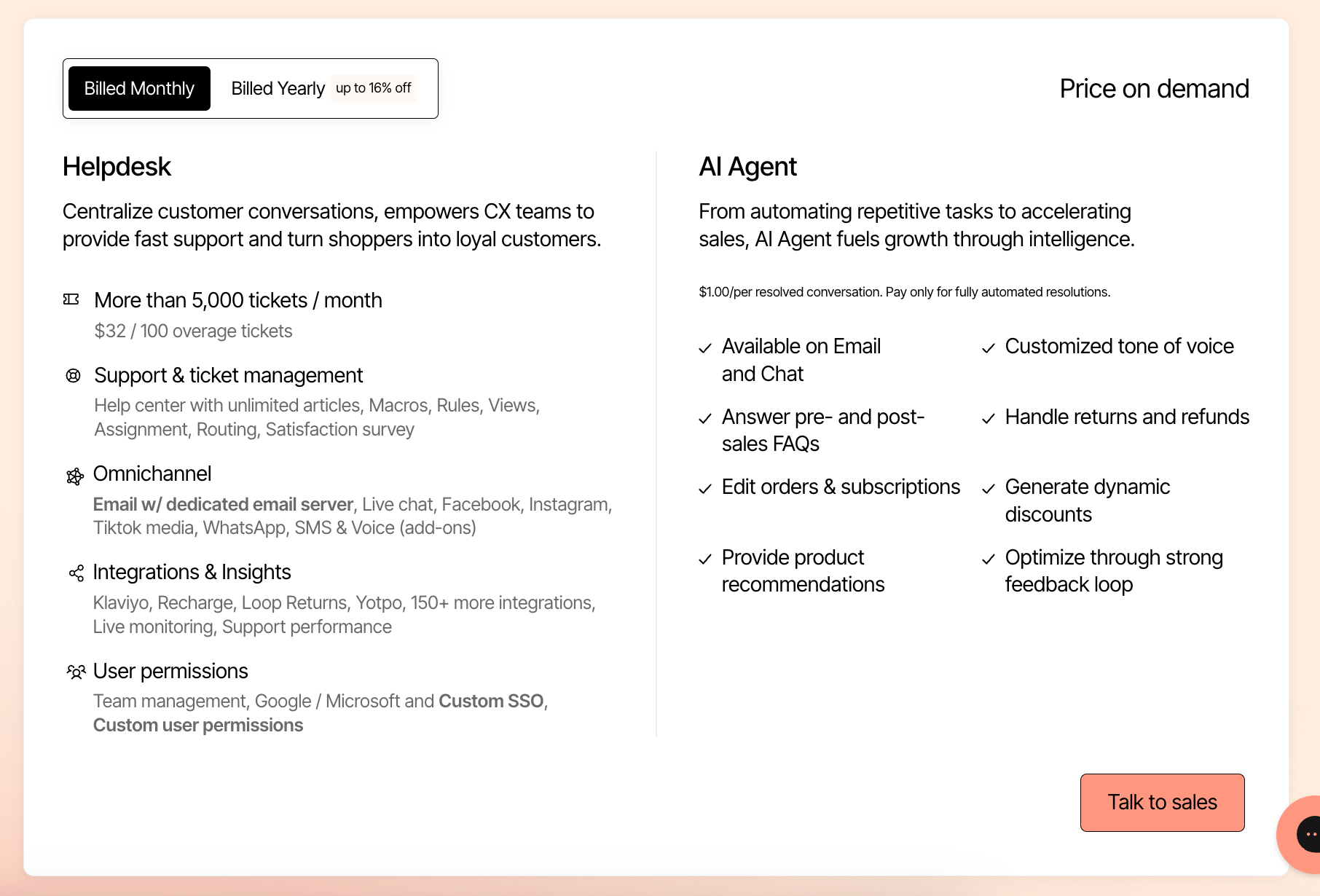
Gorgias’s Enterprise plan is custom priced and typically starts at 10,000+ billable tickets per month, with volume discounts and contractual SLAs negotiated.
Pricing is still driven by billable ticket commitments, with custom overage terms for seasonal spikes.
- 10,000+ billable tickets per month included, with negotiated tiers.
- Everything in Advanced.
- Contracted SLAs, security reviews, SSO/SCIM, and dedicated technical support.
- Enterprise implementation guidance and sandbox environments for change management.
- Unlimited users, full channel and integrations ecosystem, and custom limits.
Drawback - Ticket‑commit contracts shift seasonal risk onto you
Because pricing is anchored to committed ticket volumes, high‑season coverage often requires over‑buying capacity or accepting punitive overages, which inflates effective per‑ticket cost in shoulder months unless you precisely forecast and renegotiate across seasons.
How does Gorgias bill and what drives your total cost?
Gorgias publicly states that plans are structured around a monthly allowance of billable tickets, with overage charges if you exceed your plan’s ticket allotment.
A “billable ticket” is generally defined as a ticket that receives an agent reply, and spam or auto-closed tickets typically do not count, per Gorgias’s billing documentation.
Agent seats are unlimited on paid plans, so user count does not directly drive your subscription cost, but ticket volume and add-on usage do.
Add-ons such as SMS and voice are metered by usage, and can be a meaningful portion of the bill for high-volume programs.
Concrete example to model: if you select a plan that includes 2,000 billable tickets per month and your team responds to 2,400 tickets, you will pay the base subscription for the 2,000-ticket plan plus an overage for the extra 400 tickets at the overage rate shown on the pricing page.
If you also enable SMS for order updates and campaign replies, you will incur per-message charges based on destination and message type, which you should add on top of the base and any ticket overages.
Before purchase, pull your last 3–6 months of actual support tickets by channel, estimate how many receive agent replies, and map that to the ticket bundles and overage rates on Gorgias’s pricing page.
Does Gorgias have paid add-ons?
Yes, Gorgias lists metered and optional capabilities that can add to your total cost, most notably SMS and voice usage.
Automation and self-service features may be priced separately or by resolution volume, so confirm whether “Automate” style features are included in your tier or billed as an add-on.
Multi-brand or additional storefronts can require higher tiers or add-on fees, so verify inclusions if you operate multiple shops.
If you rely on phone support, check whether you will use Gorgias’s native voice or a partner integration and how minutes, numbers, and recording storage are billed.
Any reported surprises at renewal?
Reddit threads often cite surprises related to ticket overages during peak seasons rather than unexpected base list price jumps.
Brands that scale marketing or launch new channels sometimes exceed their ticket bundle and then see higher-than-expected invoices from overage blocks.
Teams that turn on SMS or voice and do not actively monitor usage can also see variable charges accumulate, especially during promotions or incident spikes.
To avoid renewal friction, reconcile your average and peak monthly billable ticket volumes, right-size your plan to your seasonal profile, and set alerts for SMS and voice usage 30 days before term end (Insight from Vendr).
Ask your rep to document what counts as a billable ticket, how overages are calculated, and how mid-term plan changes affect renewal pricing in your order form.
Does Gorgias change or increase pricing often?
Short answer: Yes, but nothing out of the ordinary.
Gorgias’s public pricing has centered on ticket-based bundles with transparent overage rates for several years, and buyers generally report predictable list pricing with notice of changes.
Plan names and feature inclusions can evolve, and some newer automation features may live on higher tiers or as add-ons, which can change the effective price-to-feature mix for some customers.
Is Gorgias’s price well adapted for scale?
Unlimited agent seats can be cost-efficient for larger or fast-growing teams because headcount does not increase license cost, while ticket volume becomes the main lever.
High-volume brands should model peak-season ticket loads carefully, since conversation spikes can push you into overage tiers or require a larger ticket bundle.
💡 If you are seasonal, negotiate flexibility to scale ticket bundles up and down and clarify how quickly changes take effect on billing.
Many ecommerce teams report that native Shopify and marketplace integrations reduce tool sprawl, which can offset spend elsewhere as you grow.
Do customers believe Gorgias is worth the cost?
Overall sentiment on well-known review sites is that Gorgias delivers strong value for Shopify-centric brands due to deep storefront integrations and time-saving macros and rules.
On G2, one reviewer notes,
“The Shopify integration is excellent and the automations save our team hours each week, making the price worthwhile for us.”
On Capterra, a buyer writes,
“Centralizes our email, chat, and social DMs in one place and pays for itself in efficiency once you set up templates and workflows.”
On Reddit, some users caution that “ticket-based pricing can get pricey during peak season if you are not watching overages,” which underscores the importance of modeling volume.
The clearest pattern is that teams embedded in Shopify and omnichannel ecommerce tend to rate the cost-to-value ratio favorably when consolidation and automation replace multiple tools.
Looking for an alternative to Gorgias?
Are you looking for a Gorgias alternative with predictable, no-overage pricing for your brand?
Or, perhaps you're looking for an AI chatbot that helps you convert more shoppers and lift average order value, not just deflect support tickets.
Big Sur AI is a conversational commerce platform that turns your catalog, content, and policies into a 24/7 buying assistant that proactively guides decisions and drives revenue, where Gorgias is primarily optimized for support ticket resolution.
Let's go over Big Sur AI's key features 👇
Conversion-optimized AI prompts
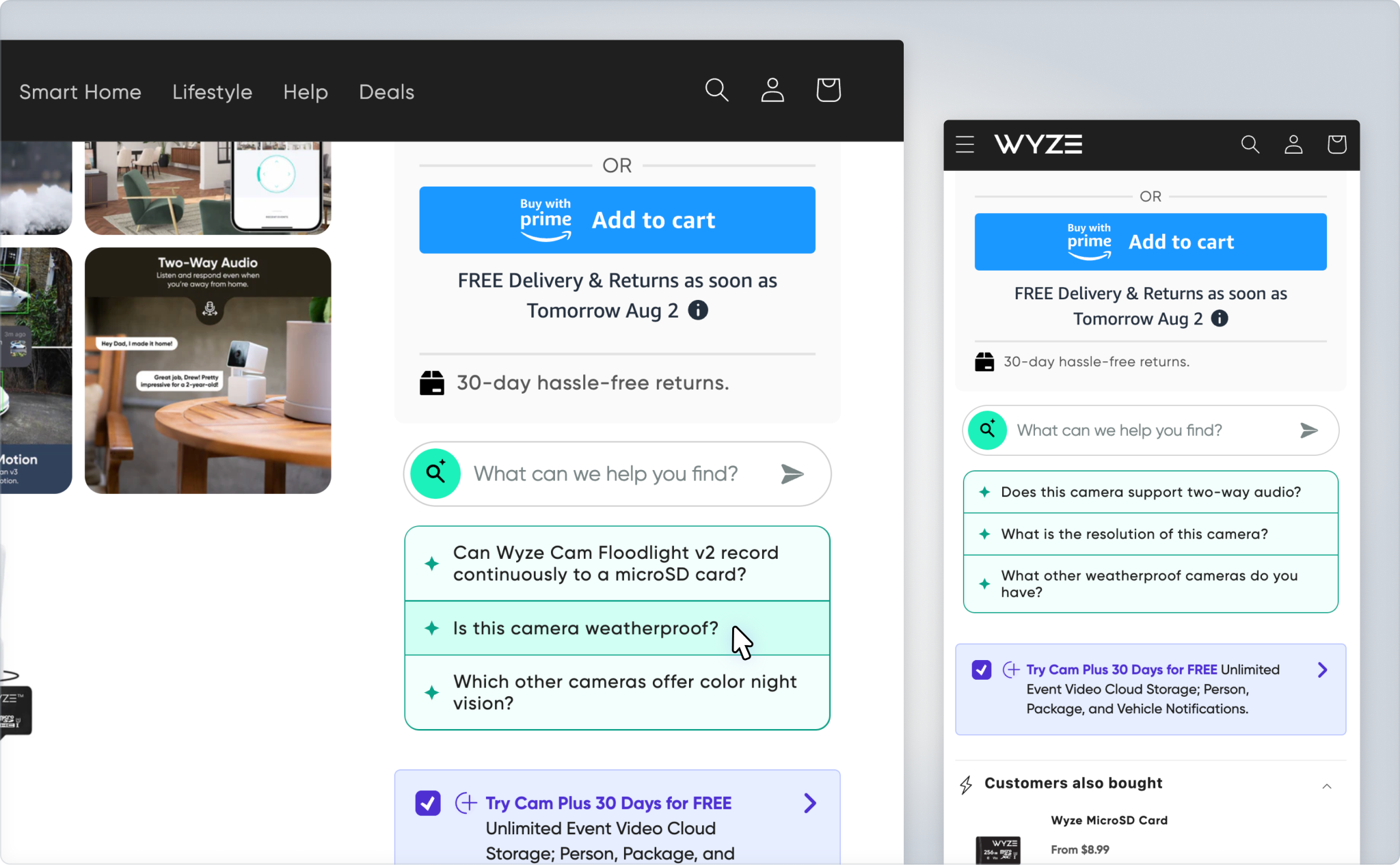
Design on-site prompts that adapt to each shopper’s context to recommend products, answer objections, and move them to checkout.
Unlike Gorgias, which centers on reactive support tickets and agent macros, Big Sur AI triggers real-time prompts based on behavior signals like pages viewed, time on page, cart contents, and return visits.
Run A/B tests on copy, incentives, and decision paths, and automatically optimize for conversions rather than ticket deflection.
Use your product data and policies to generate guided flows that collect zero-party data and personalize recommendations without manual rules.
Control frequency so prompts help, not annoy, and measure incremental revenue, cart adds, and abandonment recovery from each prompt.
AI sales agent
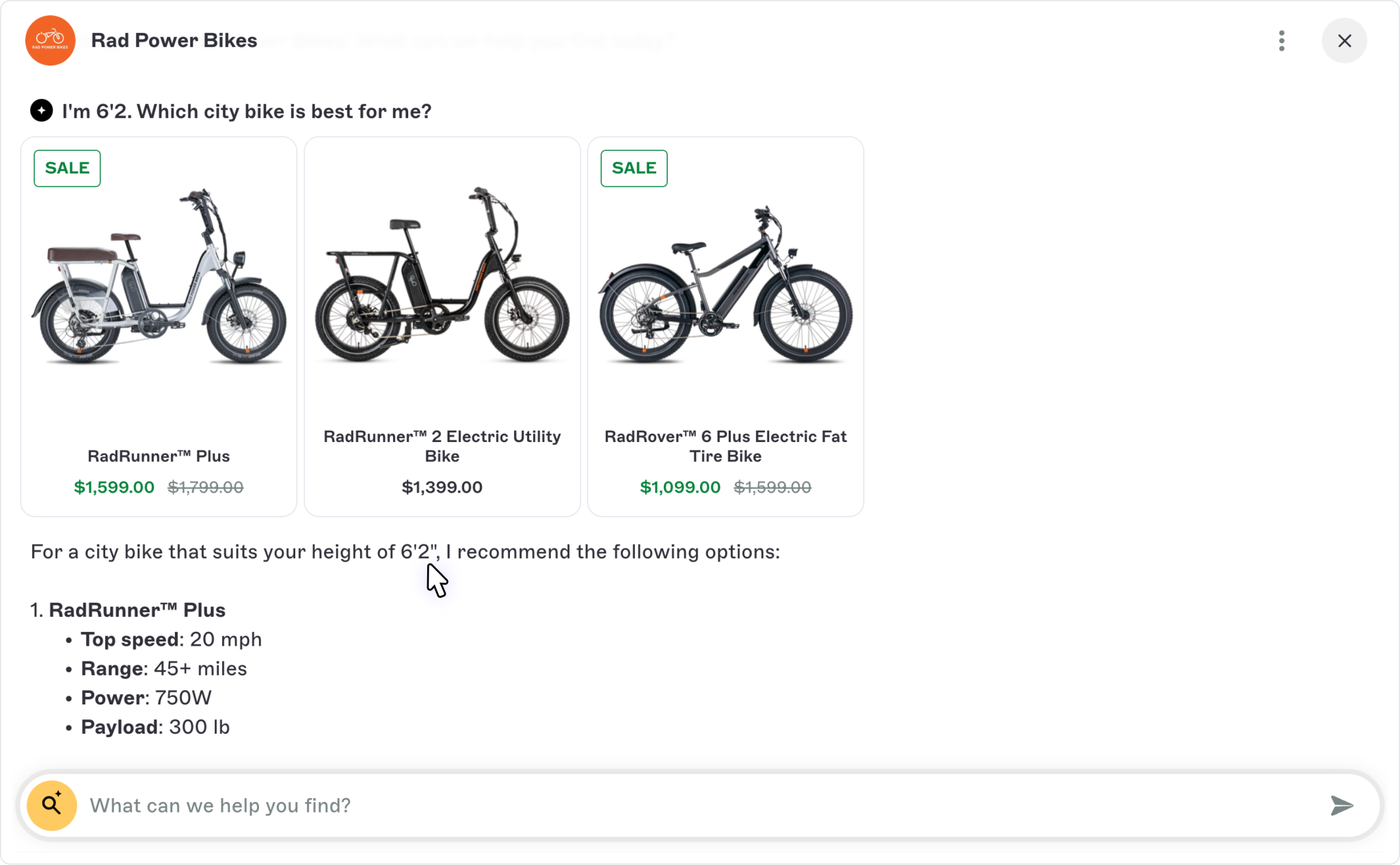
Big Sur AI’s sales agent recreates the experience of interacting with a knowledgeable, helpful associate who knows your entire catalog.
Unlike Gorgias live chat, which typically waits for a support ticket, our agent proactively engages, asks clarifying questions, and helps shoppers find, compare, and choose the right products in real time.
Available 24/7, it understands specs, compatibility, sizing, and policy nuances and can handle complex multi-step questions in natural language.
Every conversation is tailored to the shopper’s intent and stage, with recommendations ranked for the highest likelihood of conversion.
When needed, it can be configured to hand off to your team with full context.
Behavioral analytics
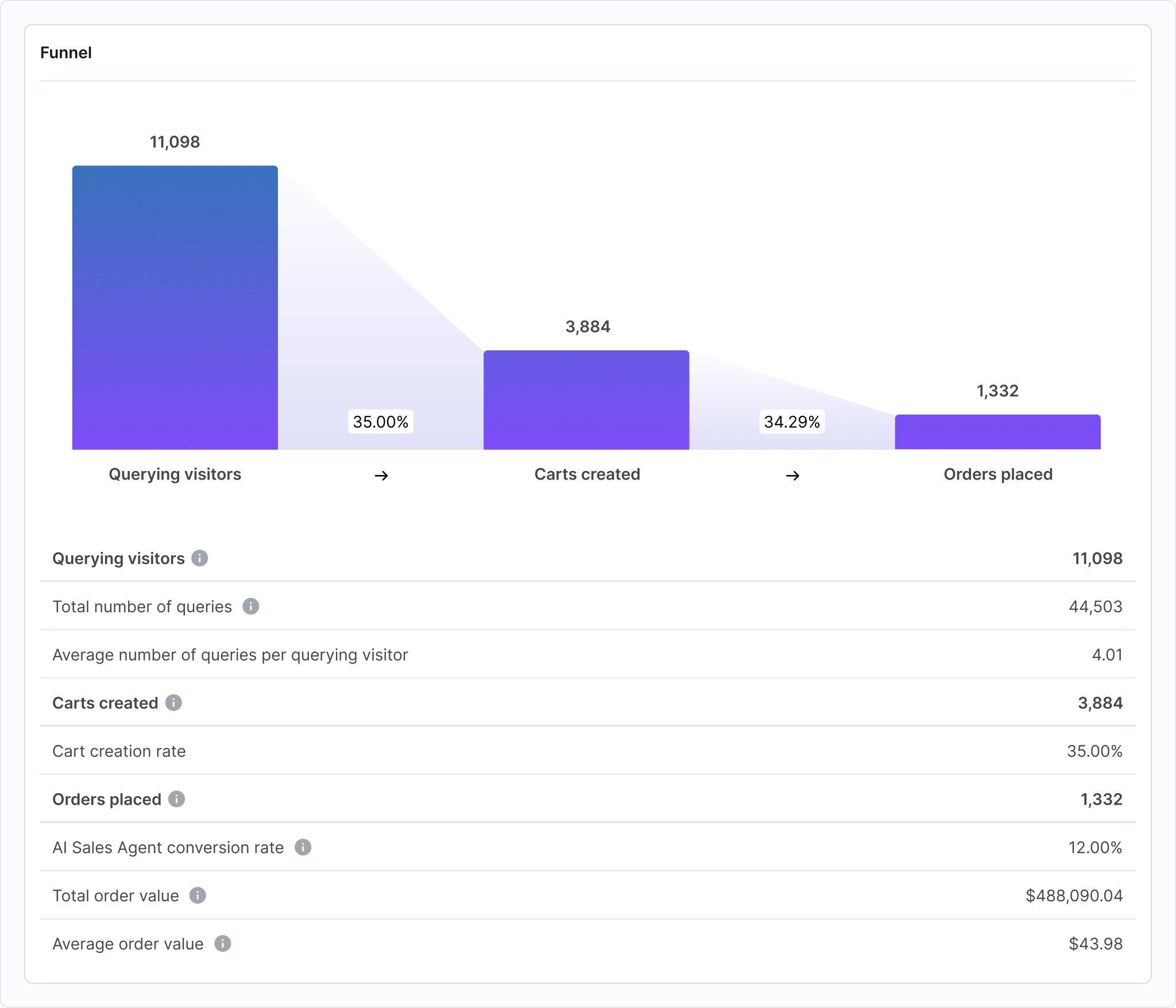
See how shoppers engage with prompts and the AI agent, which paths convert, and where they drop off, all tied to revenue, AOV, and recovery metrics.
Unlike Gorgias, which emphasizes support KPIs like first response time and CSAT, Big Sur AI reveals on-site behavioral patterns that impact sales, so you can tune prompts and conversations for maximum conversion lift.
Identify high-impact pages and moments to intervene, discover unanswered questions and content gaps from conversation clusters, and turn insights into new prompts or playbooks.
Attribute revenue to specific prompts, messages, and flows so you know exactly what is driving outcomes.
How Big Sur AI's pricing is different from Gorgias
Gorgias pricing scales on monthly ticket volume, with overage fees when you exceed your bundle and separate costs for certain automation features and channels, which can spike during seasonal peaks and promotions.
Big Sur AI offers transparent, conversion-focused plans that include unlimited seats, with usage tied to AI conversations and site traffic rather than support tickets, so growth in sales does not punish you with per-ticket costs.
You can set hard caps on monthly AI conversation volume and pacing rules to avoid surprise bills, and all plans include core capabilities like prompt testing and behavioral analytics.
For teams focused on ROI, an optional performance model can align cost with attributed incremental revenue, giving you a clear, budget-friendly path to scale.
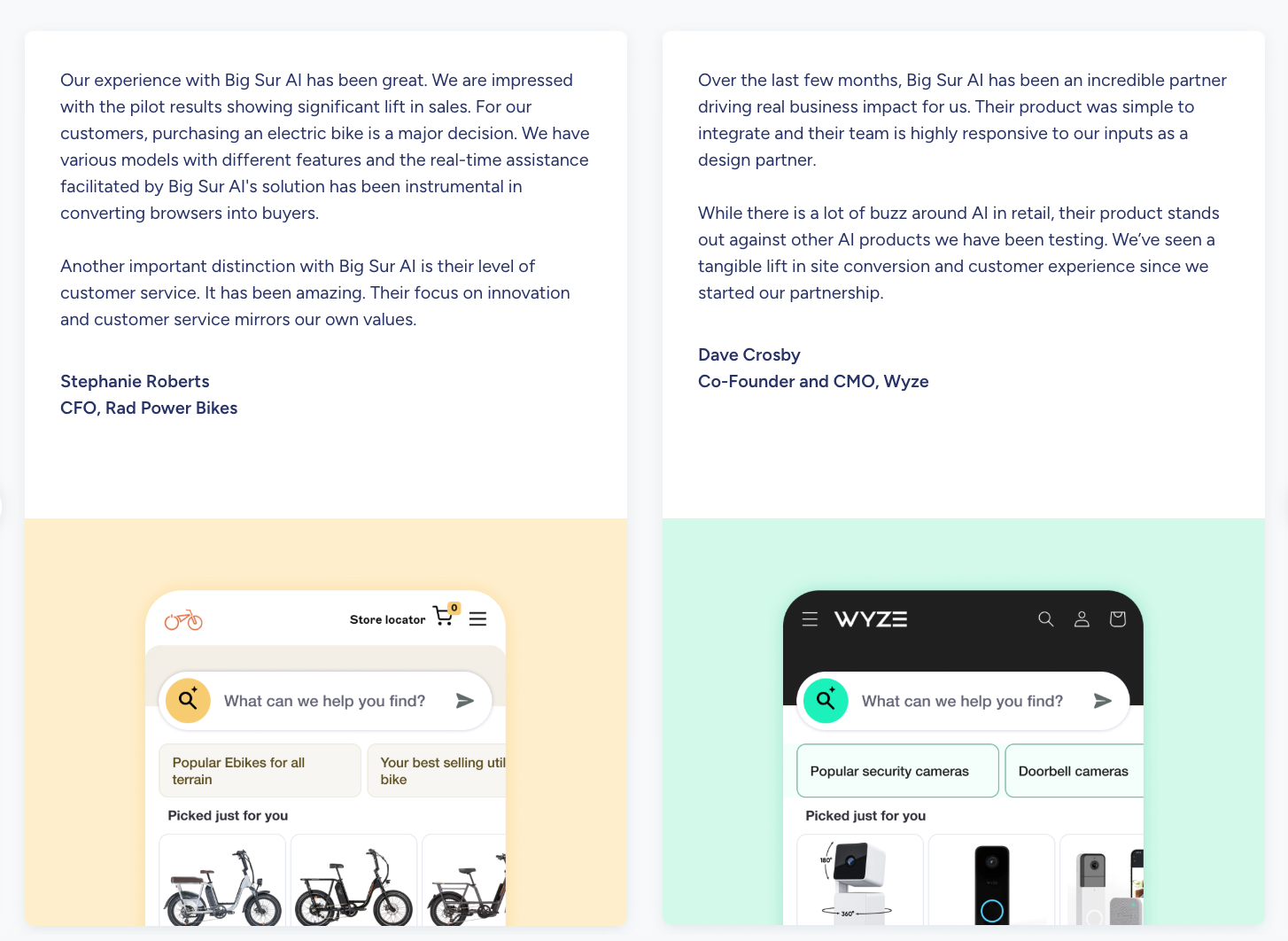
Get started with Big Sur AI today
Here’s how you can deploy a fully-trained, customizable AI chatbot on your website in under 10 minutes with Big Sur AI 👇
- Sign up on Big Sur AI's Hub.
- Enter your website URL. Big Sur AI will automatically analyze your site content.
- Customize your AI agent. Set up specific AI actions and decide where the AI agent will appear on your site.
- Launch and monitor. Your AI agent will be live in minutes, and you can track performance with real-time analytics.
